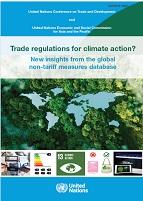
This report examines the use of trade-related regulations, known as non-tariff measures (NTMs), in support of domestic and international climate change mitigation efforts. The analysis can help policymakers and other stakeholders better understand the linkages between trade and climate policies and make more informed decisions to use trade as a driver for climate action. NTMs cover a wide array of policy tools which can be directly linked to climate action or be imposed primarily for safety, health and broader environmental protection purposes.
UNCTAD and UN ESCAP developed a methodology that identified 2’366 climate change-related NTMs in UNCTAD’s Trade Analysis Information System (TRAINS) database. While this only represents 2.6 per cent of the measures in the database, they are concentrated in world’s largest traded and most CO2 intensive sectors, such as the automotive sector. Consequently, 26.4 per cent of world trade is regulated, representing trade worth US$ 6.5 trillion.
Climate change-related NTMs cover a higher share of trade in high income and industrialized middle income countries, as they are the largest traders in these CO2 intensive sectors. Low income economies’ import baskets feature less CO2 intensive goods and their NTMs therefore have a smaller impact on global trade. But low income countries make no fewer regulatory efforts in combating climate change through NTMs. In fact, the share of climate change-related NTMs among countries’ total number of NTMs is highest in low income countries. Particularly, Small Island Development States (SIDS), which face very tangible risks from climate change, tend to take above-average action against it.
Technical Barriers to Trade (TBT) account for more than 61 per cent of all identified climate change-related NTMs. Other common NTMs are quantitative restrictions and export-related measures. While broader types of relevant NTMs are similar across countries, there is significant divergence in the details and specific requirements that hints at lacking international coordination and causes unnecessary trade costs. More international cooperation and coordination could reduce trade costs as well as regulatory efforts through sharing of best practices.
The overall economy-wide costs of climate change-related NTMs are relatively small. However, where NTMs are indeed applied, they can have significant impacts. While NTMs are generally applied in a non-discriminatory manner, they have a disproportionate effect on developing and least developed countries, micro, small and medium-sized enterprises and women traders.


